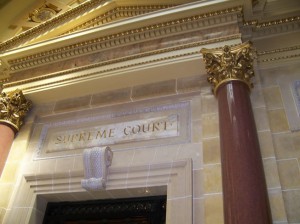Restoration franchisee to pay for territory breach
By: Beth Kevit, [email protected]//June 4, 2013//
Restoration franchisee to pay for territory breach
By: Beth Kevit, [email protected]//June 4, 2013//
 One Wisconsin franchise of Jacksonville, Fla.-based Paul Davis Restoration Inc. can be forced to pay more than $100,000 in fees and penalties to another branch in state, the Wisconsin Supreme Court decided Tuesday.
One Wisconsin franchise of Jacksonville, Fla.-based Paul Davis Restoration Inc. can be forced to pay more than $100,000 in fees and penalties to another branch in state, the Wisconsin Supreme Court decided Tuesday.
Milwaukee-based Paul Davis Restoration of SE Wisconsin Inc. sued Appleton-based Paul Davis Restoration of Northeast Wisconsin Inc. after it failed to comply with an agreement reached through binding arbitration, according to court documents. Each of the franchises alleged the other strayed from its prescribed service territory.
Brown County Circuit Judge Donald Zuidmulder ruled that a bank account under the name EA Green Bay LLC, which does business as both the Appleton-based Paul Davis franchise and as Building Werks, could be garnished for the $101,693.10 claimed in the lawsuit.
The northeast franchise appealed the decision, however, claiming the account could not be garnished. The southeast franchise’s lawsuit named only the Paul Davis company, which is a “doing business as” entity, the northeast franchise claimed, and could not legally act to comply with the garnishment decision.
The Court of Appeals agreed with the northeast franchise, arguing that doing business as another company does not create a distinct entity that could comply with the garnishment.
The Wisconsin Supreme Court, relying on three cases, reversed the appellate decision.
Similar to the circuit court, the state Supreme Court relied on Jacob v. West Bend Mutual Insurance Co. and Binon v. Great Northern Insurance Co.
Jacob entailed a question about construction defects and a lawsuit against a deceased man rather than his estate. Binon relied on Jacob for its dispute over whether an insurance policy holder met the statutory requirement to be an entity that could grant permission to restrict coverage.
The state Supreme Court also relied on Capsavage v. Esser, which dealt with a breach of contract complaint against a yacht dealer doing business under another name.
Those cases, according to the state justices, support their decision that doing business as another company does not bar the original company, in this case EA Green Bay LLC, from complying with a decision against the “doing business as” entity.
“The circuit court held that ‘the two names refer to the same legal entity,’” the justices wrote. “The Court of Appeals’ approach implicitly treated the name as a distinct but legally meaningless entity.”
Representatives from both franchises did not immediately respond to requests for comment Tuesday afternoon.
Legal News
- State Bar leaders remain deeply divided over special purpose trust
- Former Wisconsin college chancellor fired over porn career is fighting to keep his faculty post
- Pecker says he pledged to be Trump campaign’s ‘eyes and ears’ during 2016 race
- A conservative quest to limit diversity programs gains momentum in states
- Wisconsin prison inmate pleads not guilty to killing cellmate
- Waukesha man sentenced to 30 years for Sex Trafficking
- 12-year-old shot in Milwaukee Wednesday with ‘serious injuries’
- Milwaukee man convicted of laundering proceeds of business email compromise fraud schemes
- Giuliani, Meadows among 18 indicted in Arizona fake electors case
- Some State Bar diversity participants walk away from program
- Wisconsin court issues arrest warrant ‘in error’ for Minocqua Brewing owner
- Iranian nationals charged cyber campaign targeting U.S. Companies
WLJ People
- Power 30 Personal Injury Attorneys – Russell Nicolet
- Power 30 Personal Injury Attorneys – Benjamin Nicolet
- Power 30 Personal Injury Attorneys – Dustin T. Woehl
- Power 30 Personal Injury Attorneys – Katherine Metzger
- Power 30 Personal Injury Attorneys – Joseph Ryan
- Power 30 Personal Injury Attorneys – James M. Ryan
- Power 30 Personal Injury Attorneys – Dana Wachs
- Power 30 Personal Injury Attorneys – Mark L. Thomsen
- Power 30 Personal Injury Attorneys – Matthew Lein
- Power 30 Personal Injury Attorneys – Jeffrey A. Pitman
- Power 30 Personal Injury Attorneys – William Pemberton
- Power 30 Personal Injury Attorneys – Howard S. Sicula











